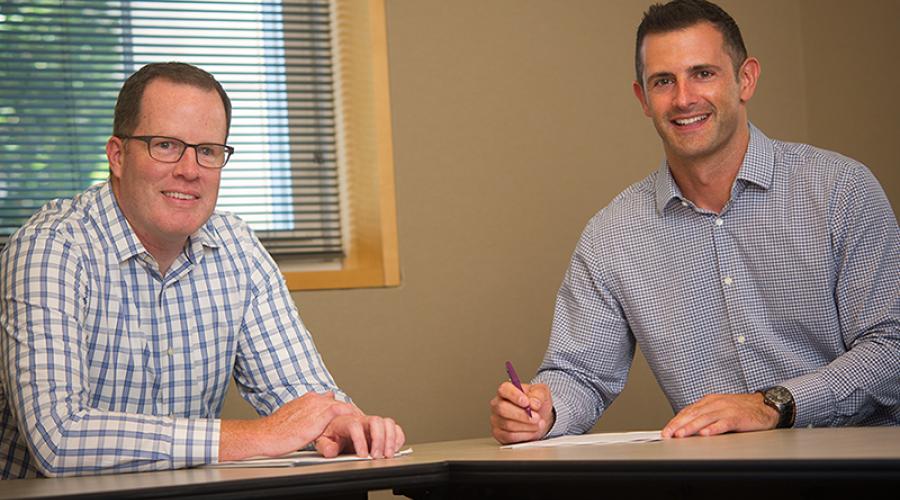
Academic Excellence in a Global City
Human resource professionals, top executives and organizational leaders from diverse industries are drawn to ILR’s 34th Street location near the Empire State Building for training and consultation to advance skills and careers, and to build organizational strategy, culture and business acumen.
ILR’s applied social sciences study of the workplace and its best practices assist leaders with reflection within their organization and empowers them to make change, executives and practitioners say.
ILR’s Executive Education and Human Capital Development programs merged this year to tie academic research more closely to curriculum delivery. Broader programming opportunities benefit the thousands of New Yorkers and others who attend these programs.
Associate Professors John Hausknecht and Brad Bell, co-directors of the combined programs, believe more organizations want customized programming.
Bell said, “Programs can be designed with the knowledge of corporate and organizational challenges to help HR professionals learn how to lead change. Our core strength is in strategic human resources and human capital development education, where training is available at the foundational, middle and top leadership levels of organizations.”
The Executive Education program pulls from the latest faculty research to train HR practitioners, often through customized programs and learning consortiums. Training is backed by decades of practice-based consulting and by continuous faculty interaction with senior HR executives through the school’s Center for Advanced Human Resource Studies.
The center’s membership of chief human resource officers and other top HR decision makers from more than 65 Fortune 500 companies collaborate on projects, emerging trends and educational efforts. The corporate data collected by the center provides discovery to HR executives and informs industry benchmarks.
Jill Carmichael, a 2002 graduate of Cornell’s School of Hotel Administration and chief of staff to the CHRO at MetLife, based in New York City, worked with ILR’s executive education faculty on a customized program for top leaders.
The unique aspect of customization was that several MetLife executives participated in the instruction, leading discussions immediately following the ILR faculty HR strategy instruction to demonstrate how MetLife objectives and practices align. The program ran on the Ithaca campus for three years, then was redesigned as a virtual program (eLearning and webinars) to reach a broader audience.
“The original executive education program was amongst the highest-rated developmental programs we have offered to HR practitioners. It pushed people to think in new ways while providing a unique experience for participants. Converting it to a virtual program has allowed MetLife to invest in more people globally, and feedback from both participants and managers has been overwhelmingly positive,” Carmichael said.
Executive Education and Human Capital Development have a broad portfolio of offerings. Certificate programs remain popular for in-class personalization, engagement on key topics and peer networking.
ILR certificate programs include:
- Diversity and Inclusion
- Equal Employment Opportunity
- Employee Relations
- Human Resources
- Employment Law
- Leadership Development
Decision makers from a variety of organizations walk through ILR’s doorway for assistance in leading initiatives. Andrew M. Upton, an attorney, worked with ILR to customize an in-house program that ran for four years, incrementally changing the focus to build expertise in conducting employee investigations. “The skill level of the employee relations and investigations teams was raised and a consistent system for investigations implemented.”
Priscilla Diaz, a senior HR assistant at Tokio Marine HCC, completed the Human Resource Management Certificate and was promoted to HR generalist shortly after. “I’m proud to have been one of the privileged participants. I will always fondly remember my experiences at Cornell ILR — all of the professors and guest speakers. My plaque is hanging high in my office with much pride and appreciation.”
Hanna Yurkovetskaya, at ADP, an HR software company, sees the value of ILR’s training. She finished two certificates: Contract Administration Studies and Advanced Employee Relations and Investigations. She has earned three promotions since beginning ILR workshops, the global employee relations manager shared. “I plan to return to take ILR’s HR Analytics to help with HR strategy decisions.”
Gisely Diaz supplemented her bachelor and master degrees, both in hospital administration, with the Advanced Employee Relations and Investigations Certificate. Her experience with the certificate helped her receive three promotions, with a recent promotion to talent acquisition manager at Mount Sinai Health System, she said. “The overview on employment laws helped me identify areas where clear organizational communications and policies can avoid potential violations.”
Rhonda Figueroa, a corporate diversity officer at New Jersey Resources, is among the many diversity professionals who completed the Diversity and Inclusion Professionals Certificate; she lists it as a qualification on her LinkedIn profile.
ILR attracts sophisticated practitioners. Judy Clark, vice president and consultant on diversity and inclusion at PNC Financial Services, manages the implementation of regional diversity and inclusion strategies and councils. Clark earned the Diversity and Inclusion Professionals Certificate and the D&I certification. She later became an instructor in the program.
Hausknecht says human capital and executive education programs help organizations identify changing needs. “We like to see more leaders understand the value of HR analytics and other applications so they can make better decisions about their workforce. By analyzing data on workforce planning, attrition and recruitment, for instance, leaders discover how each affects the business.”


